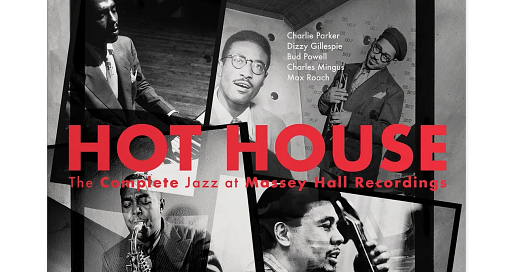Charlie Parker at Massey Hall – The Hottest House in Toronto
In the 1940s and ‘50s, many cities had what were known as “Jazz Societies” – groups of fans who would get together to listen to newly released records, discuss their favorite artists and if possible, pool their resources to promote local concerts or create privately made recordings.
The New Jazz Society of Toronto had promoted their first concert in 1952, which featured pianist Lennie Tristano, Lee Konitz and Warne Marsh. That concert was not financially successful, partly due to scheduling the concert on what turned out to be the hottest day of the year in an insufficiently small venue that lacked air conditioning.
For the society’s second effort on May 15th, 1953, they decided to book the largest local venue available. Massey Hall held over twenty-seven hundred people – an ambitious number, but if any jazz artists could fill such a venue, it was the group assembled for that night. That both the concert itself happened and was preserved on tape was something of a miracle.
Charlie Parker, Dizzy Gillespie, Bud Powell, Charles Mingus and Max Roach were considered the originators of modern jazz in the 1940s, but had long since gone their separate ways. By the early ‘50s, a reunion concert was recognized as a once in a lifetime opportunity. It also turned out to be the only time everyone in this quintet would ever record together -in a privately made recording that night for the jazz society’s own use.
Like the New Jazz Jazz Society’s first concert effort, the reunion show failed to recoup it’s costs due to extremely low audience turnout - this time reportedly due to a highly anticipated boxing match on TV.
Once again, the jazz society was unable to pay their musicians. The resulting arguments and threats ending when Mingus took the concert tape, only to discover later that his bass was barely audible due to the one hanging microphone that captured the evening’s performances.
After overdubbing his bass onto the existing quintet tracks, Mingus and Parker tried to sell the tape to producer Norman Granz’ Clef label (later to become Verve) for $100,000 – an amount most recordings at the time (especially jazz) could never hope to recoup. Granz politely declined.
This historic concert therefore ended up on Mingus’ own fledgling Debut label, edited down to three 10” LPs and later two 12” albums before bouncing around in varying reissue configurations after Debut closed a few years later.
Craft Recordings (current owner of Debut) has recently restored the concert to it’s original glory in a newly restored and re-mastered three LP set “Hot House – The Complete Massey Hall Recordings” featuring both the original unaltered quintet recordings on the first LP as well as the Mingus overdub version on LP number three. Also included on LP number two is pianist Bud Powell’s trio set featuring Mingus and Roach in it’s original 10” configuration.
The quintet set on the first LP starts off with a rousing version of Juan Tizol’s “Perdido”. A staple of jazz concerts at the time – mostly due to being constantly featured in the “Jazz at the Philharmonic” concerts - the tune is given a strong bop treatment by Parker and Gillespie.
Gillespie’s bop classic “Salt Peanuts” (complete with Gillepie’s own vocalizing of the title) leads to Charlie Parker’s and Roach’s strongest performances of the night.
After the ballad standard “All The Things You Are”, the quintet offers up intense renditions of “Wee”, “Hot House” and “Night in Tunisia”. To say that everyone is playing at the top of their game would be to trivialize the magic of the evening. The musical rapport and camaraderie displayed on each track shows how much the musicians themselves were aware of how unique and important this concert would be.
Also turning in what may be among his best concert performances is Bud Powell’s trio set on LP number two. Reportedly drunk the entire evening, the pianist, along with Mingus on bass and Roach on drums, plays a number of standards that actually display Powell’s strengths to a remarkable degree.
Comprised of the original 10” Debut release, the new edition features six of the trio’s renditions of standards, including “I’ve Got You Under My Skin”, “Embraceable You, “Sure Thing”, “Cherokee”, Hallelujah” (Originally listed as “Jubilee” on the 10” LP) and “Lullaby of Birdland”.
When Mingus issued his versions of the concert on LP in the early ‘50s, Debut Records got a much needed boost in the jazz marketplace, though not enough to secure itself a long term future. After several years of sporadic releases and limited distribution, Debut closed in 1957 and was later acquired by Fantasy Records, which began re-issuing much of the catalog in the early ‘60s.
As many in 1953 predicted, the Massey Hall concert proved to be both a unique and lasting summit gathering of the greatest jazz modernists of all time. “Hot House – The Complete Massey Hall Recordings” is both a fitting restoration and expansion of what has been often been called the greatest jazz concert ever.
-- Thank you for checking out Beyond Bop. Free subscribe to be notified of future columns.




